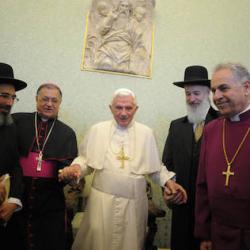Carl Trueman posted Rusty Reno’s barroom analysis of the Biola panel on the future of Protestantism. He writes in part:
“Both of us, in a sense, see an epochal change taking place in American Christianity. As far as conservative Protestantism is concerned, I connect this to the collapse of traditional Protestantism as a cultural force, and, more specifically, to the judicial and social ways in which gay marriage has come to function in society. Peter (if I read him correctly) sees the epochal change in terms of the ecumenical opportunities that now exist. For me, the answer to our problems is to be found in large part by recovering the theology, the categories, and the church practices of the Reformed of the sixteenth and seventeenth centuries. For Peter, it is by setting those largely aside and working with the ancient creeds as a basis for developing new modes of ecumenical engagement.”
A few observations on Rusty’s typically astute observation. First, I agree with Carl that the crisis of American Christianity, and American civilization, is linked to the crisis of American Protestantism.
Second, I partially agree that a restoration of classic Protestantism is part of the Protestant church’s response. For mainline Protestantism (and partially for Evangelicalism as well), that means a return to the Bible, the whole Bible; I’d say that the “categories” we need to “recover” are preeminently those of Scripture, only secondarily of the Reformation. For Evangelicalism, a restoration of Protestantism means a recovery of Reformation worship, which has been far better preserved in Lutheran and Anglican churches than in Reformed or free church traditions.
I only partially agree because I think we Protestants have to ask to what degree lacunae and flaws within classic Protestantism might have sown the seeds that we are now bleakly harvesting. What if the categories of the Reformation were themselves in part responsible for the current collapse? What if returning uncritically to Protestantism was a return to categories and practices that created contemporary culture? How, for instance, did latter-day New England Puritanism fold so quickly into Unitarianism? Fred Sanders would have some interesting things to say about that.
And that leads to a third point: One of the lacunae of Protestantism has been a failure of catholicity, and that failure is deeply bound up with the cultural crisis Carl talks about. Brad Gregory’s thesis (Unintended Reformation) that modern secularism is a byproduct of post-Reformation divisions is pretty compelling, even if it needs qualifying here and there. And if that’s true, then perhaps a Protestantism that ignores the ecumenical opportunities is a Protestantism that replicates the errors that led to the cultural crisis in the first place.
Fourth, Rusty’s analysis implies an inversion of what I think are the priorities of the moment. We don’t pursue unity and catholicity for the sake of addressing the cultural crisis. We pursue unity and catholicity because the Lord of the church commands it, prays for it, shed blood for it. I don’t believe the American church’s goal should be to enable America to weather the storm. I think that there will be huge cultural and political effects as the church pursues unity, but those are side-effects of the church being more and more the one body she is.
And one final note: I do believe that the ecumenical creeds are a basis for engagement, a standard to judge who counts as a brother and which communities are sister churches. But those creeds only provide the beginnings of a much fuller theological and practical engagement. That engagement has to be at base an engagement, together, Catholic-Protestant-Orthodox, with the Scriptures. Of course I would say that; I’m a Protestant. But what alternative do we have: The Bible is the common text we have to work with.
And if, in spite of the centuries of division and hostility, we can miraculously discover from the Scriptures grounds for a more unified confession of the gospel, if the Bible and the Spirit enable us to somewhat transcend the fragmentations of centuries, then we should set out on the voyage and see where it takes us.











